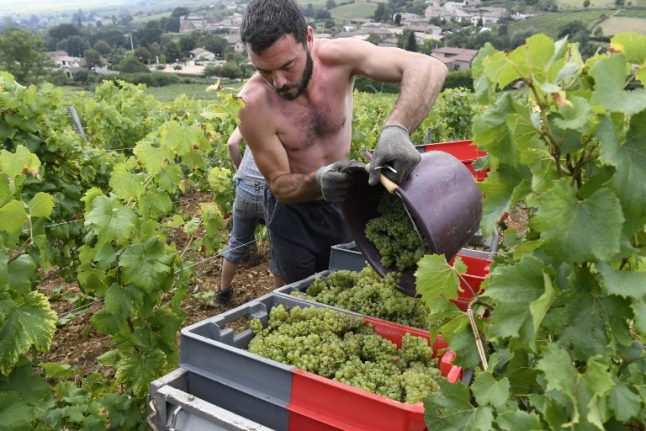
EMPLOYMENT
Looking for a job in France? These are the sectors desperately seeking workers
These are the sectors with the most openings in France right now, according to figures released on Thursday.
Published: 20 April 2017 17:01 CEST

Photo: AFP
In the face of depressingly low employment levels in France, don’t lose hope that you can find work here.
France's employment agency Pole Emploi released a list of the top sectors that are seeking workers this year, so here's a good place to start looking.
For a start… have you ever dreamed of picking grapes amid the natural beauty of Alsace or Bordeaux? If so you are in luck. One of the top industries that will be recruiting in 2017 is wine production.
And don't forget, grape harvesting comes with all the advantages of rural life in France: rolling countryside, glorious chateaux and, of course, very fine wine.
For those of you who like this sort of lifestyle then farming, which comes sixth on the list, provides another opportunity to escape to the French countryside.
Or if you prefer the city and fancy your own Amélie Poulain experience working as a waiter in Paris, there is an opening for you too. Waiting tables in restaurants and cafés is third on the list of the biggest job openings in France.
Parisian cafés have been known throughout history for their creative clientèle so working in a café could be your chance to meet inspiring individuals and unleash your inner artist.

The Deux Moulins café in Montmartre, where Amelie worked. Photo: WIkiCommons
The top ten jobs in France for 2017
1. Winegrowers and tree surgeons
2. Maintenance technicians
3. Waiters
4. Restaurant workers
5. Community workers
6. Farmers
7. Domestic helpers
8. Carers
9. Packing and warehouse work
10. Musicians and dancers
If you are already skilled in the arts, there is a demand for you too. Musicians and dancers also make the top ten. Imagine yourself busking on Parisian streets, earning your bread through your passion and mingling with other creatives.
Tree surgery is the other job area that tops the list. This makes sense when you consider that France has over 12 billion trees. We all know that many of these border the countryside roads to form the famous French avenues. Viewed as a safety hazard for the number of car accidents they cause, perhaps these roadside trees could the reason for a high demand for tree surgeons.
Other large job openings in France include maintenance technicians, community workers, and carers.
However these professions require a certain level of French. If your language skills aren’t up to scratch, there are still plenty of jobs in France where you don't even need French.
For example, being a nanny can help fund your dream life in France because families are generally keen for their children to learn English from as young an age as possible. Another obvious option is to teach English, although neither of these may be the most lucrative of choices.
Other top options where French isn't necessary include working as an estate agent, seeing as a great many English speaking foreigners seek second homes or residency in France.
An alternative option is the tourism sector, for example working as a tour guide or ski instructor.
Lastly, if you none of these appeal to you, take the first step by jumping into The Local's own English-language job section here. Bonne chance.
Url copied to clipboard!




 Please whitelist us to continue reading.
Please whitelist us to continue reading.
Member comments